Sneaker retailers are a 'white boys' club' built on Black creativity — and capital
The guest bedroom in Earl West’s home in suburban Atlanta looks more like a sneaker warehouse.
From floor to ceiling, covering the entire space, shoe boxes filled with some of the most exclusive sneakers, in various colors and designs, are stacked on top of shoe boxes. Inside them are nearly 900 pairs of sneakers valued in West’s estimation at more than $100,000.
“My friend who got me into this jokes with me, saying he was the one who put the needle in my arm. And I can’t seem to shake it,” said West, 55, a self-described “sneaker head” who is a manager at a data center and started collecting in 1982. “At the same time, it’s been messed up that there aren’t nearly enough Black stores to spend Black dollars on sneakers.”
West is among the thousands of people in America, especially Black males, who are fixated on sneakers, so much so that they are the drivers of a market that pulled in $70 billion in 2020, according to the market research company Statista.
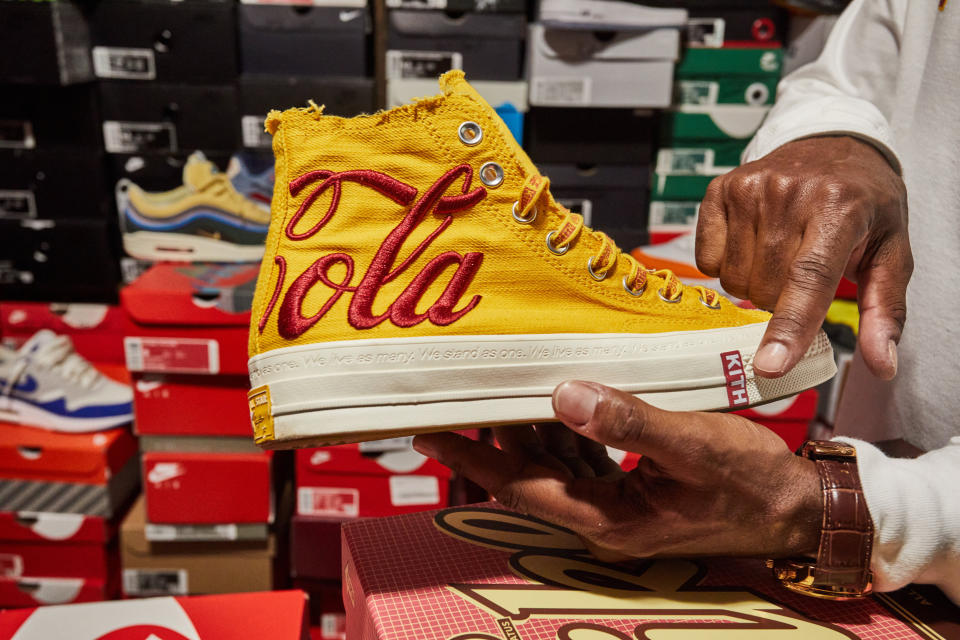
At the same time, there is a harsh reality: While Black culture has made sneakers an invaluable element to any wardrobe and Black consumers are at the heart of that financial tide, Black retailers of the coveted items are hard to find.
Nike released a sustainability report in March that opened with a word from its president and chief executive officer, John Donahoe, saying, “Our brand would not be what it is today without the powerful contributions of Black athletes and Black culture.”
And yet, while some retailers are working on changing the disparity, those “contributions” generate little in the way of Black wealth.
“Any sort of cultural force is always absent of any power, and it’s done often in a misleading way to suggest that Black people have an economic strength that doesn’t actually exist,” said Jared Ball, a pop culture authority who is a professor of African American/African Diaspora Studies at Morgan State University. “Saying that this is a consumer-based economy does not mean that consumers actually have power.”
Owning a corner of a billion-dollar industry
Many in the industry — from retail store owners, consumers, franchisees and executives — have expressed concern that only 5 percent of sneaker retailers in America are Black.
“It’s a white boys’ club, like most things,” said James Whitner, a Black man who has carved out a successful niche with boutique apparel and sneakers stores in several cities. “There are people aware of it, but their privilege doesn’t force them to have to change it.”
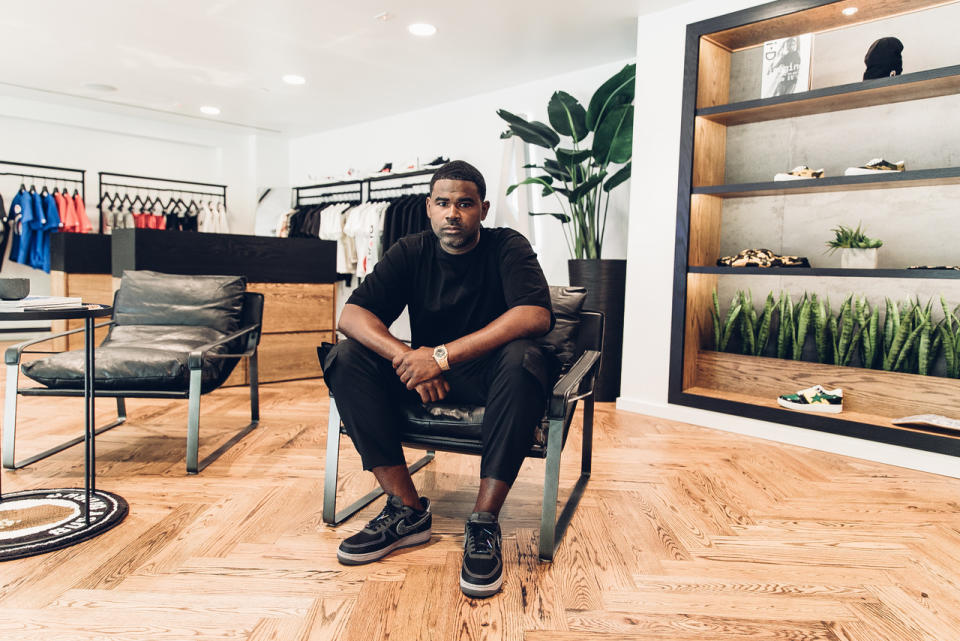
Whitner’s business has evolved from an apparel and sneaker shop in Charlotte, North Carolina, to several boutiques throughout the East Coast for his company, The Whitney Group.
Whitner has been so successful that Vice President Kamala Harris visited his store while on the campaign trail last year. He also collaborated with Nike to create a sneaker, the A Ma Manerie x Air Jordan 3, named for his shop in Atlanta.
But Whitner is an anomaly in the industry, even with help from his community.
“My saving grace was I had a good ecosystem of a few Black people who taught me the ropes,” he said. “But on the other side are white gatekeepers who are keeping us out. Changing it is an individual choice, especially for white Americans because they’re part of a system that has been created to keep us out.”
There is no identifiable data that tracks the number of Black-owned independent sneaker retail stores, but Whitner said he knew them all and counted 18 — including three in Europe. “That’s it,” he said.
Whitner maintained his first store for five years, but he made a change in 2011 that took his business into the stratosphere, he said. “My first store was called Flava Factory. That name was very Black, very urban,” he said. So he changed it to Social Status. “And all of a sudden, the opportunities started to change. From that point on, the business has just exploded.”
For Ball, significant change could only come through political power. “What has to happen is public policy developed by law or through policy mandates that the wealth being created by all of this consumption and exchange, as in the $70 billion sneaker industry, has to be redistributed back to the people doing the consuming,” he said. “That’s not telling Black people to start a sneaker distribution program or a sneaker company, because there is no catching up to Adidas and Nike and whoever else. So, the only thing that can be done is consumers’ having not only the right to withhold their money, but the right to have what we consume benefit all of us. And it’s not easily done, obviously, but I think the only real solution.”
Isom Lowman, who is Black, owned 22 Athlete’s Foot stores, but has since bought and sold several of them, bringing his total to nine.
“You can count us on one hand in the whole sneaker industry,” Lowman said. “Considering we are the main consumers, the ones who built this industry, that’s sad.”
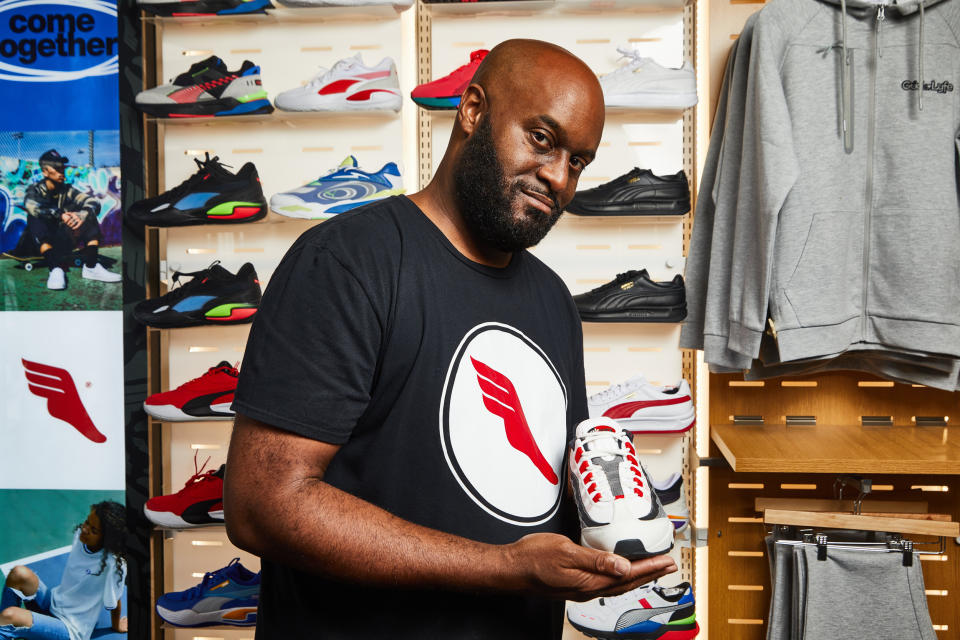
The barrier to entering the retail market is high for a prospective store owner, between corporate control over which stores can even sell their sneakers, and required startup costs that begin at around $60,000.
“Resources are required to be successful,” Whitner said. “And not many of us have the resources or the business savvy, or the understanding of what it takes to actually win in this industry. Starting when you’re disadvantaged is hard.”
Ball traced the emergence of sneakers in pop culture to the 1986 rap song, “My Adidas,” by Run DMC.
“Sneakers have a history with hip-hop, Russell Simmons and Run DMC and the influence of their relationship with Adidas and popularizing sneakers and sneaker culture,” Ball said. “Hip-hop, broadly speaking, as a fashion force, in and of itself, relates also in general to Black people’s overall influence on American culture and popular culture. It’s been pointed out: There is no American pop culture without Black people.”
Black influence ignited the sneaker phenomenon, erupting when Michael Jordan emerged as a global sensation in the early 1980s. Between Nike’s creative marketing and Jordan’s soaring popularity, Air Jordan sneakers became a must-have for young people everywhere.
As West, the sneaker head put it, the right pair of kicks “tell a lot about who you are.”
Lowman, 45, said it bothers him that an industry driven by Black dollars and Black culture is not inclusive to Black business. He got started when he was 22, in 1998. He graduated a semester early from Morehouse College, and scrambled for resources to secure his first store. He used some leftover scholarship money, a loan from his parents (who took out a second mortgage on their home), earnings from investing in Yahoo and a small business loan to purchase his first store.
“It wasn’t easy, but I had a lot of support and was able to pay back my parents and buy other stores,” he said. “I’m grateful the Athlete’s Foot had a relationship with a bank that was financing franchises, because we know how much racism there is in banking.”
Lowman said acquiring a retail space now, however, is more difficult for Black people than it was two decades ago.
Nike, the behemoth athletic brand, plays a huge role because of its universal popularity, he said. It alone can determine a store’s profitability and existence. The shoe brand has implemented a direct-to-customer element that cuts out many retailers. It has also become more selective over which stores sell its products, often focusing on its own retail stores instead. On top of that, Nike is producing fewer shoes in recent years to drive demand even further.
“Back in the day, if you had a Nike account, you could open up a store pretty much anywhere,” Lowman said. “But now, it’s hard to get a Nike account. So that makes it a whole lot harder for people in the business to expand, and it definitely has made it a whole lot harder for people to get into the business.”
Nike did not respond to NBC News’ requests for comment.
Lowering the barriers
Darius Billings, who has worked in the athletic apparel/sneakers industry since graduating from Howard University in 1988, is a senior director of product and marketing for the Athletes’ Foot. Billings said he was inspired by a conversation with a group of family and friends during the Black Lives Matter-led social justice movement last year to consider how his company could be a factor in bridging racial inequities.
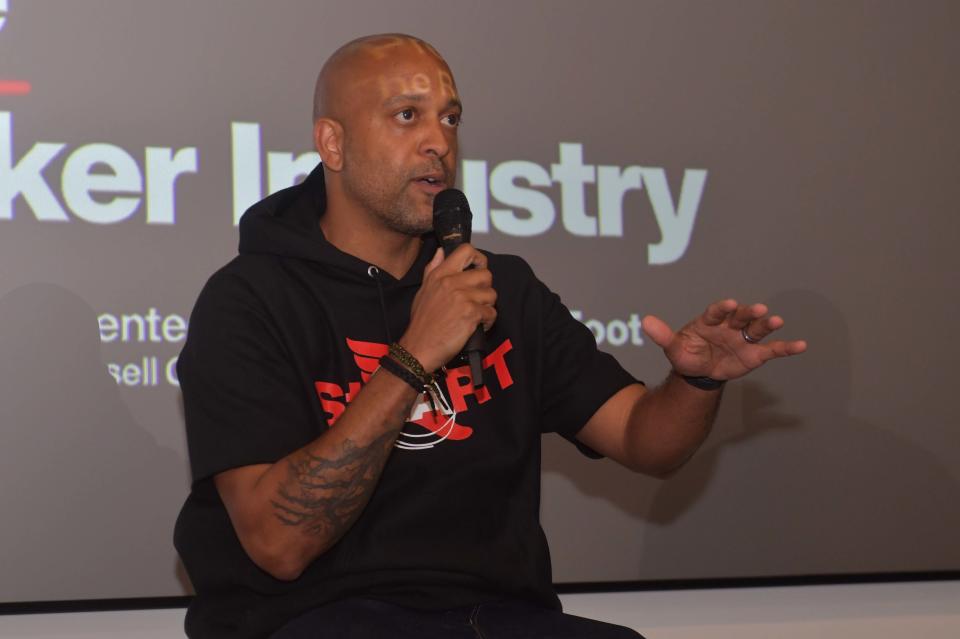
This past spring, he launched the Strategic African American Retail Track or StAART program, which is designed to address Lowman’s and Whitner’s points about helping create pathways for Black entrepreneurs to become retail store owners.
“The program is about fostering change within an industry that was really built on Black culture, Black influence and Black community,” Billings said. “And from a holistic standpoint, I looked at ownership and questioned myself: How many Black retail owners are out there in the sneaker space? Not many and not nearly enough.”
StAART recruits, encourages and supports Black entrepreneurs in the sneaker industry by educating, exposing and helping them clear the traditional barriers Black potential business owners face.
“I wish StAART was around when I got into the business,” said Jennifer Ford, owner of the sneaker boutique Premium Goods in the Rice Village section of Houston. Seventeen years ago, she became the only Black female proprietor of a sneaker store in the country that sold all the major brands like Nike, Nike’s Jordan Brand, Adidas and New Balance.
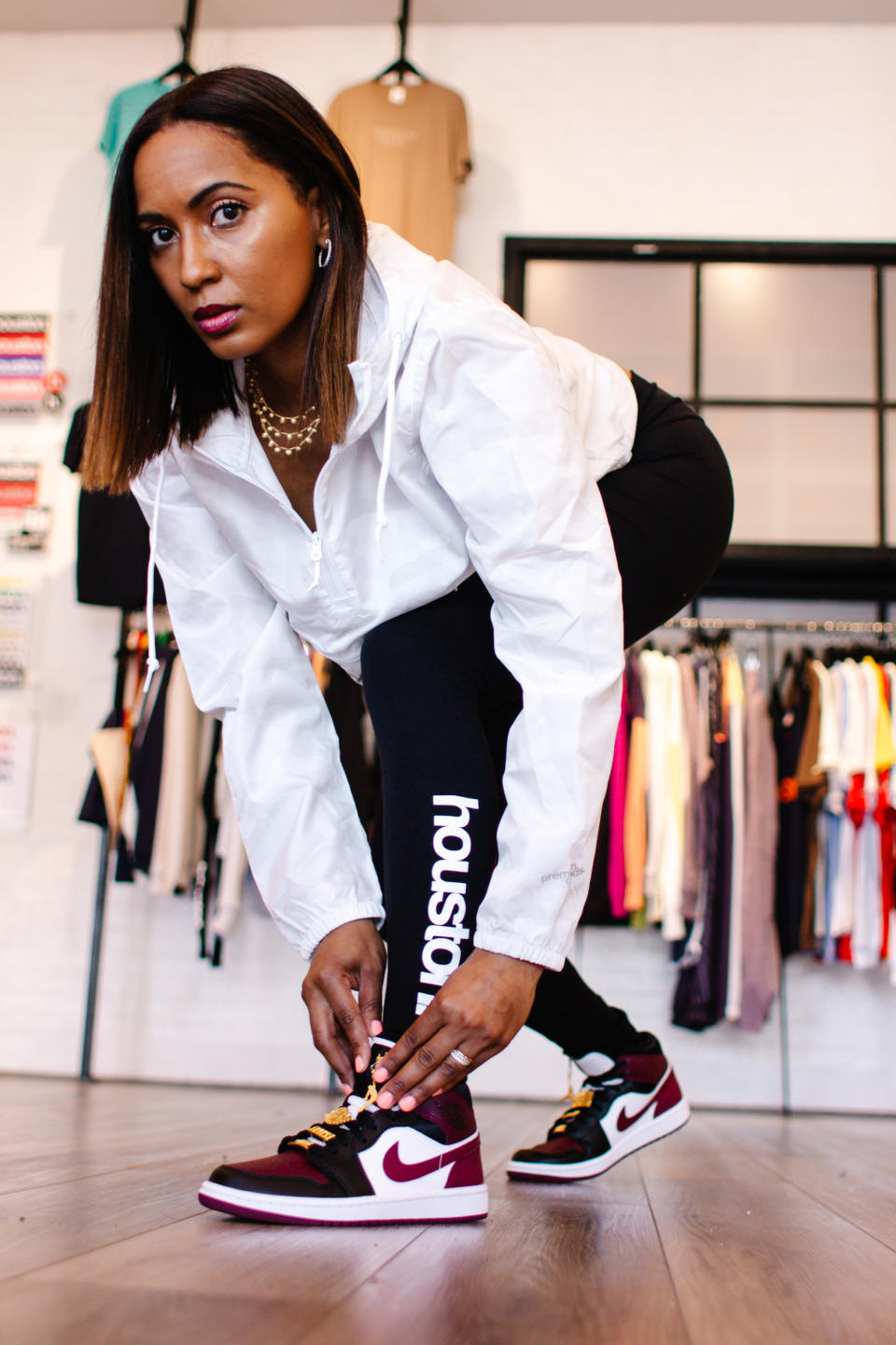
A friend in the business encouraged Ford, a buyer for a department store in New York at the time, to join in, and she used “every penny I had” to create her business.
“But if there was StAART around, it would have helped me so much,” she said. “It would have been amazing to have someone tell me to ‘Watch this’ and ‘Don’t do that.’ ‘Make sure you get a really good accountant.’ Also, I would have had more confidence to expand and have other stores. It has been hard for me to potentially risk losing everything I have built to get another store.”
Whitner said he has for years shared information with potential Black retail store owners through annual summits.
“Half our business is profit, the other part is nonprofit, and our whole goal was to bring people in our industry,” he said. “I’m working with business partners like Nike and from other industries like Bank of America, and we’re strategically working on summits, classes — anything that we can do to help bring Black people along to really help try to close the gap for our industry. Change isn’t going to happen overnight. But the work is being done every day.”
He added that Black potential business owners have to do their part, too. “When there are resources out there,” Whitner said, “we have to step into them and hold ourselves personally accountable to get to a place where we can break the system. We don’t break the system by just saying that system is against us. We break a system by succeeding in the system, then letting that system know what’s wrong with it.”
‘Camping Out’ For Sneakers
West said he would solely support Black-owned retail stores if he had more options. So ingrained is West in the sneaker-head underworld that he once spent four days in line outside of Whitner’s Social Status to be among the first to purchase a pair of Air Max 97s, a 2018 Nike collaboration with the esteemed shoe designer Sean Wotherspoon that was made partially of corduroy. Pairs can sell online today for as much as $2,000. They retail for $160.
West would not be alone spending dark nights to secure a pair of sneakers.
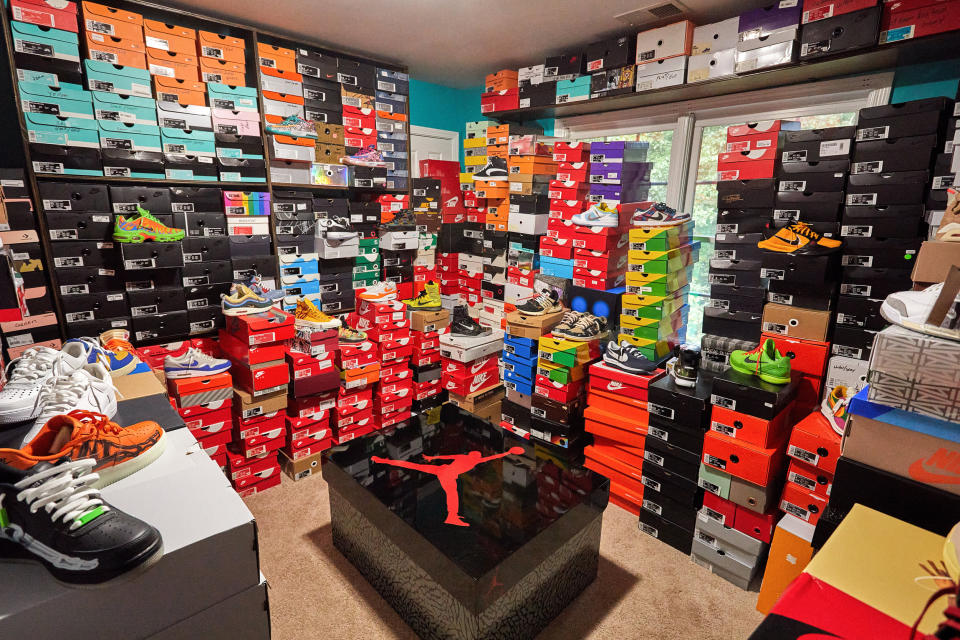
“When we were camping out, after two days, one of us would say, ‘I’m about to run home and take a shower and get something to eat,’” said West, who slept in his SUV overnight to hold his spot. “I’d ask if the guys would want something to eat and eventually get back to my spot.”
West acknowledged that his obsession with sneakers is not practical. But he pointed out that he donates dozens of pairs of shoes a year to homeless shelters or organizations that serve the needy. Still, before the pandemic, he wore a different pair of sneakers every day for two years.
Sidebar: Sneakers are so hot, resellers are making a living off of coveted models
West said he has spent about $30,000 on shoes that are now worth more than three times that because some have increased in value over time. He knows he has also overpaid for many by going through resellers, who have added another element to the sneaker world.
“Yeah, I know it might not make sense to most people, but it is what it is to us, to real sneaker heads,” West said. “We love it. We sacrifice for it. And there’s no shame about it.”
In fact, his life is playing out as he had told his mother it would. “When I was growing up in Seattle, we couldn’t afford a lot of things,” he said. “My dad worked for Safeway, and we would have to go buy Safeway shoes. One day, I told my mom, ‘When I’m old enough, I’m going to buy all the shoes that I want.’ And sure enough, that’s what I’ve been doing.”
Ultimately, sneakers’ dominance in mainstream society speaks to the power and influence of Black culture. The lack of Black sneaker retailers speaks to something different.
“This is an opportunity for us to own our ideas,” Billings said. “Black culture created this phenomenon, and that’s why I hope this Black Lives Matter movement doesn’t become a point in time, but instead an ongoing thing, and that we push for equality and equity ... and support and create Black business.”

